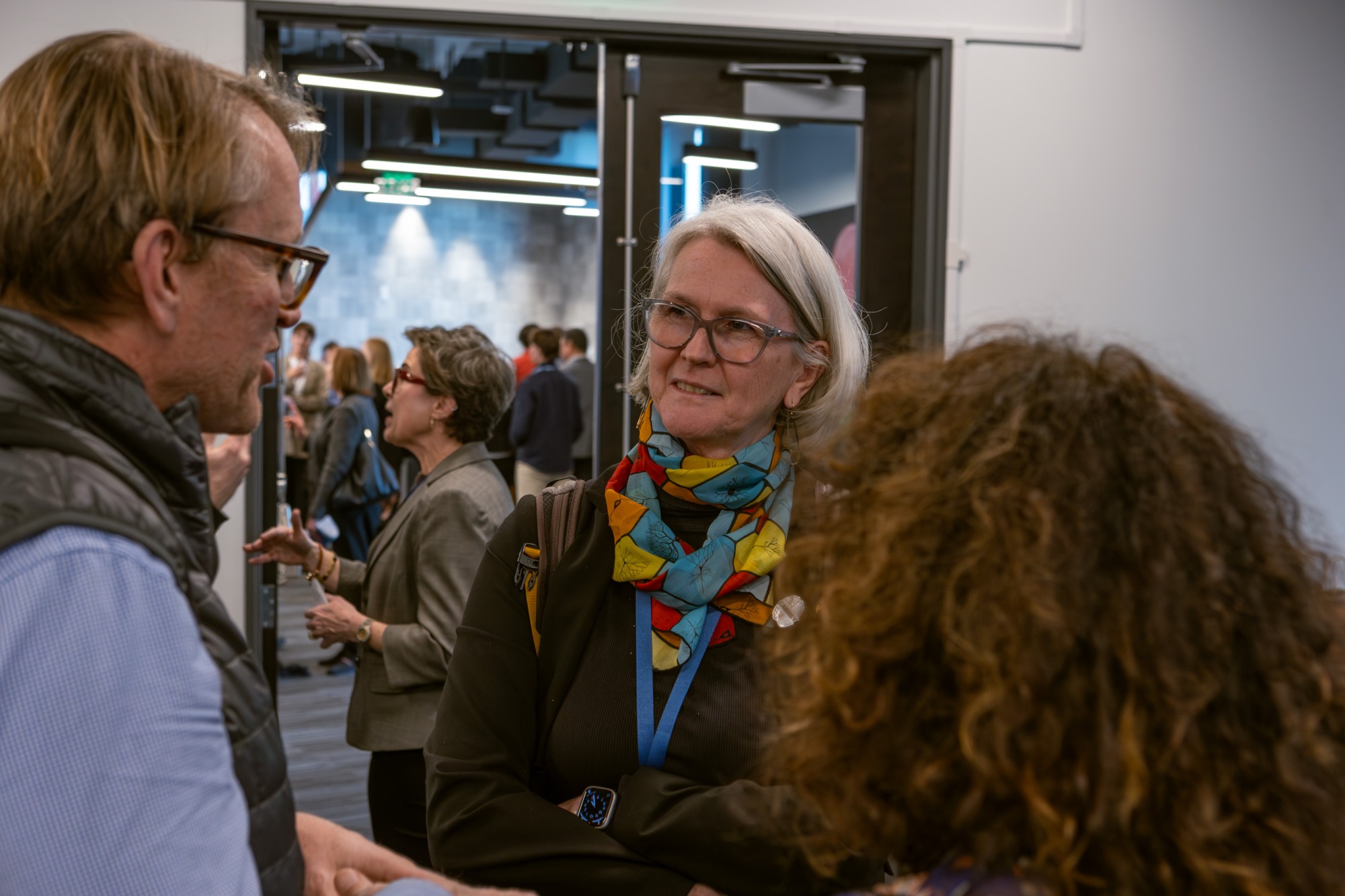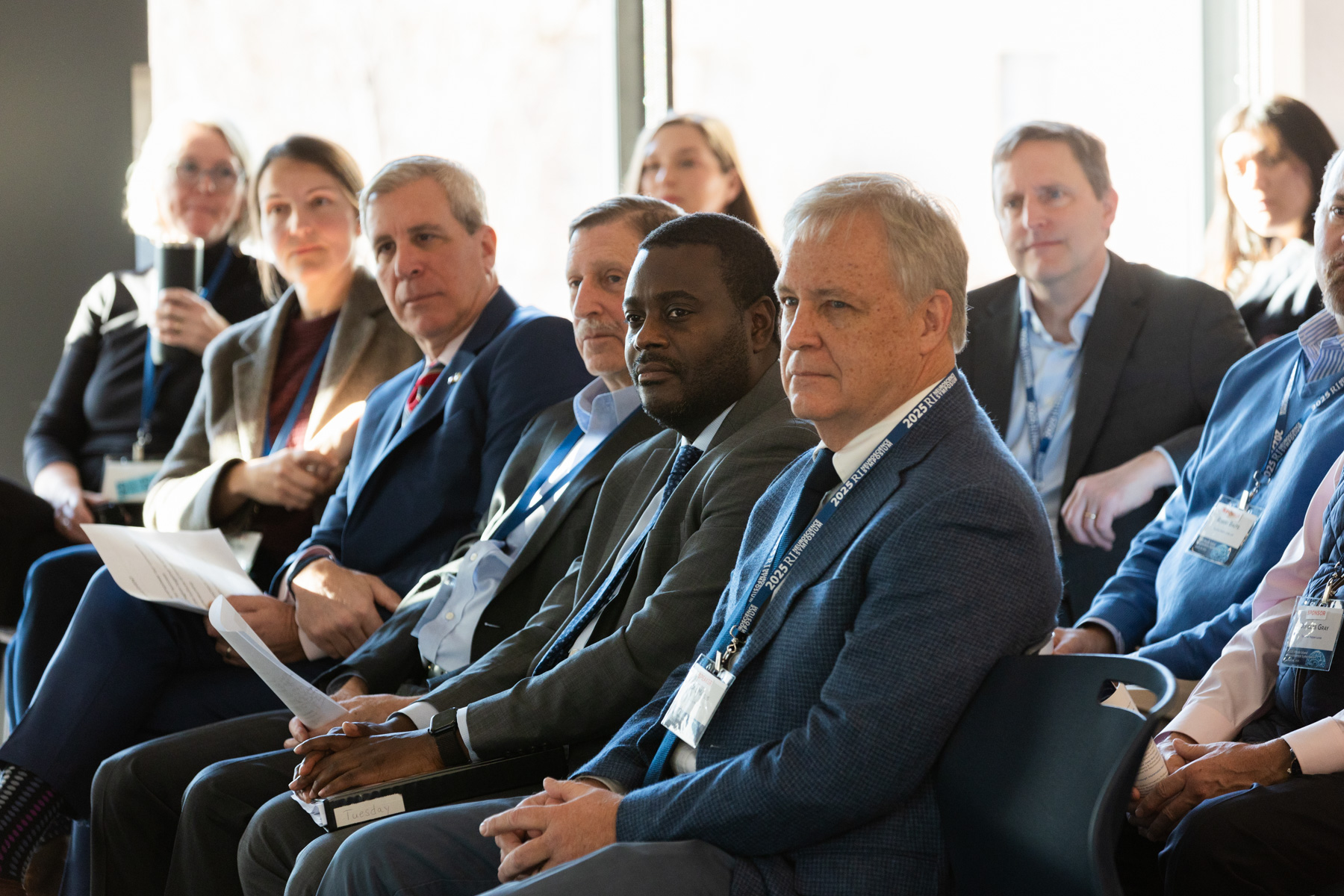On Jan 28, 2025, Rhode Island researchers, investors, entrepreneurs and community members convened for the Rhode Island Neuroscience Symposium organized by the Rhode Island Life Sciences Hub, a new state-backed initiative to grow Rhode Island’s life sciences sector.
The daylong event, held in District Hall in Providence’s Jewelry District, showcased the promise at the intersection of brain science and entrepreneurship and featured several scientists affiliated with the Robert J. and Nancy D. Carney Institute for Brain Science. Diane Lipscombe, Carney’s Reliance Dhirubhai Ambani Director, kicked off the day by noting the “huge density” of local researchers studying the brain, not only at Brown University, but the University of Rhode Island, Butler Hospital, the Providence VA Medical Center and Rhode Island Hospital.

“Human capital is really hard to build–and we have that,” she said. “Students want to stay and convert their ideas into tech and therapies. The energy is there. The people are there. We are at an important tipping point in the state.”
The event was designed to showcase local brain science talent. In a series of “mini-sessions,” seven leaders of neurotech businesses pitched their innovations. Four presenters were trained in Carney-affiliated labs and spun their business concepts out of research they’d conducted there:
- Bolden Therapeutics develops first-in-class therapeutics to promote neurogenesis–the formation of new neurons in the adult brain–as a potential treatment of central nervous system diseases such as Alzheimer’s and ischemic stroke. Bolden’s CEO and current Brown medical student Johnny Page, trained with Bolden co-founder Justin Fallon, a Brown professor of medical science and psychiatry and human behavior, and Ashley Webb, a former Brown associate professor of molecular biology, cell biology, and biochemistry.
- Operant BioPharma uses robotics, deep learning, computer vision, and optogenetics to develop therapeutics for age-related diseases such as Parkinson’s disease and Alzheimer’s disease. Operant BioPharma’s proprietary robotic microscope maintains, watches, and autonomously runs its own experiments on brain cells taken from patients, in order to first identify and then reinforce the cells’ natural resilience factors. Operant BioPharma’s CEO, Drew Linsley, an assistant professor of cognitive and psychological sciences, received support for his business from Carney’s BRAINSTORM Program. He trained in the lab of co-founder Thomas Serre, a professor of cognitive and psychological science and computer science and associate director of Carney’s Center for Computational Brain Science.
- SOMA is a smartphone app designed for the approximately 50% of chronic pain patients who do not see improvement in their symptoms from traditional treatment options. By using a smart system to gather patient information, the app provides custom treatment options grounded in cognitive science. CEO Chloe Gunsilius, an MD/PhD student at Brown, conducts research in the lab of SOMA co-founder Frederike Petzschner, an assistant professor of brain science at Carney and co-director of the institute’s BRAINSTORM program.
- Reach Neuro uses a spinal implant to restore a stroke patient’s ability to use their shoulder, arm and hand. Rhode Island-based CEO Marc Powell trained in the lab of David Borton, a Carney affiliate and an associate professor of biomedical engineering.
The program also gave attendees a look back at the decades of progress that helped bring Rhode Island brain science to Lipscombe’s “tipping point.” Speakers highlighted progress in neurotechnology, Alzheimer's disease and rare genetic diseases.
John Donoghue, former director of Brown’s Institute for Brain Science and neurotechnology pioneer, provided a look back and a look ahead at neurotech systems like BrainGate, which allows paralyzed people to control computers and communication and movement devices using only their thoughts. The panel of faculty members that convened after his talk described how neurotechnology can also make an impact for people with depression, post-traumatic stress disorder and amyotrophic lateral sclerosis.

Bess Frost, director of Carney’s Center for Alzheimer’s Disease, brought together director of Brown’s Center for Aging John Sedivy and assistant professor of pathology and laboratory medicine Martin Taylor to discuss the novel possibility of targeting retrotransposons–genetic elements that become active and behave like viruses in diseases ranging from Alzheimer’s to HIV–to combat neurodegenerative disorders. Eric Morrow, director of the institute’s Center for Translational Neuroscience, spoke about the center’s mission to understand a host of rare genetic diseases and described the community of patients that has emerged thanks to the center’s approach of combining molecular research with clinical applications.
Infrastructure to support translational life science is coming to Rhode Island. Brown is scheduled to complete construction of the William A. and Ami Kuan Danoff Life Sciences Laboratories in spring of 2027, while the Rhode Island Life Sciences Hub is developing Ocean State Labs, an incubator space for biotech start-ups, with Brown support. Keynote speaker Brad Margus, a biotech entrepreneur with Rhode Island ties, said these efforts will attract even more investment.
“Convince venture capitalists you can make progress fast,” Margus said, “and they’ll come wherever you are.”